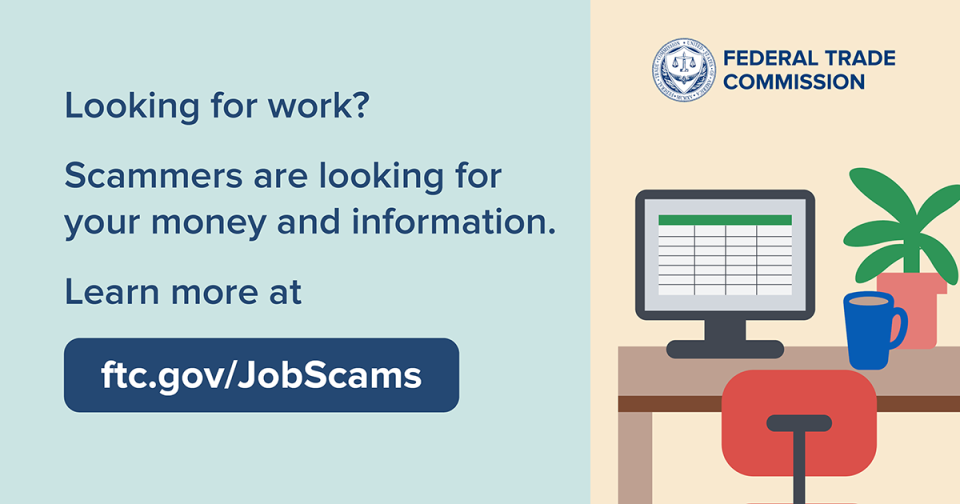Found a job listing to telework as a Spanish translator or a data entry clerk with great benefits and pay? Scammers are impersonating real employers on legitimate platforms like ZipRecruiter and Indeed. When you respond, they might even schedule interviews and send you paperwork that looks legit. But it’s all a scam to get your information and steal your money or your identity. Here’s how to know you’re dealing with a scam.
Everything moves really fast. As soon as you apply, the so-called employer only wants to schedule an interview using Signal Messenger or similar text-only apps. You agree, answer a few questions — and bam, you got the job! The next thing you know, they’re asking you to fill out direct deposit and tax forms with your bank account and other personal information. In some cases, they might send you a large check with instructions to set up your home office. But by the time you realize the job is fake, the scammers already have your money and information.
To avoid job scams without passing up a good job opportunity:
- Do some research before you apply. Look up the company online or call using a phone number you know to be real. If you can’t verify the job opening, it could be a scam.
- Talk to someone you trust. Describe the offer to them. What do they think? This also helps give you vital time to think about the offer.
- Never pay for a job or equipment. Honest employers won’t ask you to pay upfront, and they won’t send you a check and then tell you to deposit it and send them part of the money. Those are scams.
Report phony job opportunities to the FTC at ReportFraud.ftc.gov and the website where you saw the job posting.
Did you give personal or financial information for a job that turned out to be fake? Go to IdentityTheft.gov to report it and get a recovery plan.


Thank you, this is vital information and I respect this organization to keep folks like me informed. I’ve been looking for a side hustle online, I will due my diligence.
These are everywhere now and it's getting almost impossible to tell, yet companies want to hire online and you can rarely talk to live people anymore, so what do you do?
Some are also multi level marketing (MLM) and/or pyramid schemes that sound like insurance or other similar sales jobs, so be extremely careful!
Tnx for the information 🙏❣
Yes,I've been hit twice by the same attempt scam. Cover name is world vision, party identifies themselves as (Fred Russel.) This creap has sent me two $2800.00 fake checks,. I sent back a text saying, " I only accept a cashiers check."
Be aware
Thank you for letting us know what's going on and (asking you to pay for the job<?>)I think that's really a 'BIG' Red flag.
Seems like the latest scam is emails that claim you've signed up for a service that you never ordered. I've been receiving multiple emails such as these & have threatened to report them to the FTC, Attorney General, etc. Emails sent with bogus transaction number and 'thank you' message. Older folks might be lured into giving their banking details or credit card information in an effort to 'cancel' a service. Heads up!!
Thanks for the advice